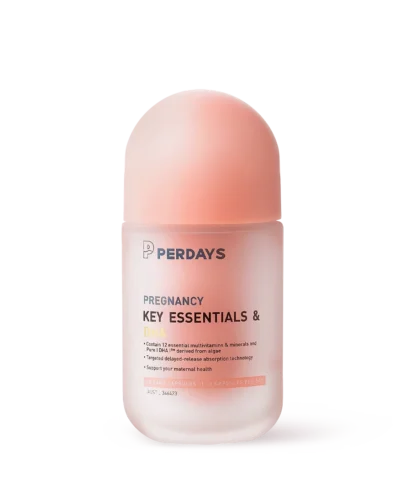Contents
- What’s the difference between prenatal and regular vitamins?
- When should you start taking a pregnancy multivitamin?
- Are prenatal vitamins necessary?
- Is it OK to take a regular multivitamin instead of a pregnancy multivitamin?
- What Vitamins Should I Take Daily While Pregnant?
- What Happens if you don’t take prenatal vitamins while pregnant?
Pregnancy Multivamins: The Basics
- Pregnancy multivitamins are designed to supplement your existing diet
- They include a selection of vitamins and minerals that are crucial for the well-being of the pregnant mother and her developing baby
- These supplements are meant to provide additional nutrients that the mother’s diet might be missing.
- Many pregnancy multivitamins contain folic acid, iron, calcium, vitamin D and others that are crucial for foetal development and maternal health during pregnancy.
- It is recommended that most women take a pregnancy multivitamin (or prenatal) before and during pregnancy.
- A pregnancy multivitamin contains a different combination of nutrients than regular multivitamins for women
Pregnancy Multivitamins: 7 Key Questions Answered
If you are pregnant, trying to conceive or just thinking about becoming pregnant, you are bound to have questions about vitamins, prenatals, pregnancy supplements and nutrition in general.
in this guide, we ask and answer 7 common pregnancy multivitamin questions so you can make informed decisions about your pregnancy – whatever your stage.
What’s the difference between pregnancy multivitamins and regular vitamins?
When it comes to pregnancy vitamins and regular vitamins, the main difference is their nutrient composition. Prenatal vitamins contain higher levels of folic acid, iron, and calcium, which are essential for foetal development and the health of the mother during pregnancy.
On the other hand, regular multivitamins are intended for general health and are not formulated to meet the specific needs of pregnant women. While they may contain similar nutrients at a lower concentration, they will often contain many others too.
Common Minerals:
Calcium, copper, iron, manganese, magnesium, phosphorus, potassium, zinc, selenium and iodine.
Common Vitamins:
Folic acid, niacin, riboflavin, thiamin, vitamin B-6, vitamin B-12, Vitamin C, Vitamin E
When should you start taking a pregnancy multivitamin?
Ideally, women should start taking a pregnancy multivitamin before they become pregnant – ideally at least three months before conception.
This is because the neural tube, which forms the baby’s brain and spinal cord, develops very early in pregnancy, and often before a woman even knows she is pregnant. Folate is particularly important during this time, as it can help prevent neural tube defects.
In short, if you are trying to become pregnant, you should be taking a pregnancy multivitamin every day.
Are pregnancy multivitamins necessary?
Prenatal vitamins are generally considered necessary for almost all pregnant women.
While it is possible to get all the nutrients you need from your diet, in reality, most women do not manage to do this. And this is even more problematic before and during pregnancy when your body’s nutrient needs grow significantly.
Taking a daily prenatal multivitamin can help ensure you get the nutrients you need for a healthy pregnancy. Prenatal multivitamins are specifically formulated to meet the nutritional needs of pregnant women and their developing foetuses.
Is it OK to take multivitamin instead of Prenatal?
It is generally recommended that pregnant women take prenatal vitamins instead of regular multivitamins. Prenatal vitamins are specifically formulated to provide the optimal amounts of nutrients needed for foetal development and the health of the mother during pregnancy.
However, if a woman is not able to take prenatal vitamins for some reason, she may consider taking a multivitamin instead. If you are considering this, discuss this with your health professional.
While multivitamins can provide some of the same nutrients as prenatal vitamins, they are not specifically formulated for pregnancy and may not contain the optimal amounts of these nutrients. For this reason, it is generally recommended that pregnant women take prenatal vitamins instead of regular multivitamins. However, if a woman is not able to take prenatal vitamins for some reason, she may consider taking a multivitamin instead.
What Vitamins Should I Take Daily While Pregnant?
In addition to taking a prenatal vitamin, pregnant women may also need to take other supplements to meet their nutritional needs. For example, women who are deficient in vitamin D may need to take a vitamin D supplement, as this nutrient is essential for bone health and immune function. Women who are not getting enough iron from their diet may also need to take an iron supplement, as iron is needed to make red blood cells.
What Happens if you don’t take prenatal vitamins while pregnant?
Simply put if a pregnant woman is deficient in the nutrients vital for healthy foetal development, the risk of certain birth defects in the baby may increase.
For example, a deficiency in folate (rather than folic acid which is synthetic) can increase the risk of neural tube defects, while a deficiency in iron can lead to anaemia.
We always stress that women focus on their diet first. It’s important to maintain a healthy and balanced diet that includes plenty of quality protein, green leafy vegetables, whole grains, and fresh fruit.
A pregnancy multivitamin should assist and complement your diet, not replace it.
Whatever pregnancy multivitamin you choose, make sure it contains sufficient amounts of quality nutrients your body needs at your stage.
Looking For a Pregnancy Multivitamin with DHA?
Perdays Pregnancy Key Essentials & DHA Perdays is designed to work synergistically to support your preconception and prenatal health, thanks to our patented Nutriseal™ encapsulation technology. This pregnancy multivitamin contains a precise combination of 12 essential prenatal vitamins & minerals with algae-derived DHA and Folinic Acid to be absorbed by all women.
References
- https://www.hsph.harvard.edu/nutritionsource/folic-acid/
- https://www.healthdirect.gov.au/folate
- https://pubmed.ncbi.nlm.nih.gov/20608755/


